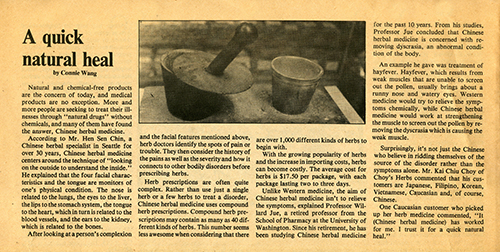- Home
- About
- Old Newspaper Articles
- List of Articles
- A Quick Natural Heal
Unknown Newspaper
By Connie Wang
Natural and chemical-free products are the concern of today, and medical products are no exception. More and more people are seeking to treat their illnesses through “natural drugs” without chemicals, and many of them have found the answer, Chinese herbal medicine.
 According to Mr. Hen Sen Chin, a Chinese herbal specialist in Seattle for over 30 years, Chinese herbal medicine centers around the technique of “looking” on the outside to understand the inside.” He explained that the four facial characteristics and the tongue are monitors of one’s physical condition. The nose is related to the lungs, the eyes to the liver, the lips to the stomach system, the tongue to the heart, which in turn is related to the blood vessels, and the ears to the kidney, which is related to the bones.
According to Mr. Hen Sen Chin, a Chinese herbal specialist in Seattle for over 30 years, Chinese herbal medicine centers around the technique of “looking” on the outside to understand the inside.” He explained that the four facial characteristics and the tongue are monitors of one’s physical condition. The nose is related to the lungs, the eyes to the liver, the lips to the stomach system, the tongue to the heart, which in turn is related to the blood vessels, and the ears to the kidney, which is related to the bones.
After looking at a person’s complexion and the facial features mentioned above, herb doctors identify the spots of pain or trouble. They then consider the history of the pains as well as the severity and how it connects to other bodily disorders before prescribing herbs.
Her prescriptions are often quite complex, Rather than use just a single herb or few herbs to treat a disorder, Chinese herbal medicine uses compound herb prescriptions. Compound herb prescriptions may contain as many as 40 different kinds of herbs. This number seems less awesome when considering that there are over 1,000 different kinds of herbs to begin with.
With the growing popularity of herbs and the increase in importing costs, herbs can become costly. The average cost for herbs is $17.50 per package, with each package lasting two to three days.
Unlike Western medicine, the aim of Chinese herbal medicine isn’t to relieve the symptoms, explained Professor Willard Jue, a retired professor from the School of Pharmacy at the University of Washington. Since his retirement, he has been studying Chinese herbal medicine for the past 10 years. From his studies Professor Jue concluded that Chinese herbal medicine is concerned with removing dyscrasia, an abnormal condition of the body.
An example he gave was treatment of hayfever. Hayfever, which results from weak muscles that are unable to screen out the pollen, usually brings about a runny nose and watery eyes. Western medicine would try to relieve the symptoms chemically, while Chinese herbal medicine would work at strengthening the muscle to screen out the pollen by removing the dyscrasia which is causing the weak muscle.
Surprisingly, it’s not just the Chinese who believe in ridding themselves of the source of the disorder rather than the symptoms alone. Mr. Kai Chiu Choy of Choy’s Herbs commented that his customers are Japanese, Filipino, Korean, Vietnamese, Caucasian and, of course, Chinese.
On Caucasian customer who picked up her herb medicine commented, “it (Chinese herbal medicine) has worked for me. I trust it for a quick natural heal.”Company: The Hensen Herbs

